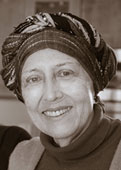People living with breast cancer – especially those with metastatic disease* – need and deserve a better quality of life. So we established the Metastatic Breast Cancer Collateral Damage Project to make a significant difference for these women and men by:
- Capturing and quantifying all the life-altering impacts – the collateral damage – of metastatic breast cancer and its treatment, using a Health of Women (HOW) Study™ questionnaire to document them
- Developing concrete recommendations to improve quality of life
The Story Behind the Metastatic Breast Cancer Collateral Damage Project
This project has its roots in an earlier Collateral Damage Project that included extensive crowdsourcing and a HOW quality of life questionnaire that was completed by nearly 12,000 women and men, with and without breast cancer. Their answers revealed – not surprisingly – that metastatic breast cancer patients have a significantly diminished quality of life, compared not only to healthy people but also to people who have had a primary breast cancer diagnosis and treatment.
As a result of those findings, we decided to focus next on metastatic patients, and to do it by taking a fresh approach that would focus more on the issues that really matter to patients than on what researchers may think is important.
Advocate Task Force
We engaged a highly diverse Advocate Task Force, composed of 11 women and men with metastatic disease themselves, to guide us and provide their insights at every step of the way. Below are quotes from 5 of our Advocates.
Why did you feel that the MBC Collateral Damage Project Questionnaire was important for you to be a part of?
-
Patricia

"Metastatic Breast Cancer is too easily defined by statistics. Statistics on diagnosis and survival. Those statistics fail to capture the tears in my father's eyes as I was wheeled into an operating table. They negate the sleepless nights that are consumed by fear and the skipped outings with friends from nausea. The MBC Collateral Damage Project aims to capture these experiences; experiences that are a very real part of the hardship of living with cancer."
-
Lori

“As an MBC patient, it’s easy to feel marginalized. We are often shunned from mainstream breast cancer communities as the embodiment of early stage patients’ deepest fears. Research to understand and change the deadly nature of our disease is difficult and grossly underfunded. This Project is a remarkable opportunity to change how we live with our disease. No one project can solve the challenges of MBC, but this one will have an authentic and positive impact on how we live with it, and how our health care system can better support us. I know my time is limited, probably by my disease – using it toward real and sustainable change is an honor, and I’m grateful for the opportunity.”
-
Sheila

"When asked to participate in the project not only was I honored to represent women living with Stage 4 disease, but pleased to become a part of this important conversation. As someone living with late stage cancer for 7 years, I can give honest input of the collateral damage the disease and treatment can cause, physically as well as emotionally. I’m very grateful to Dr. Susan Love and her staff for creating an avenue for MBC patients can voice their concerns and recommendations on how we can improve the lives of women and men living with metastatic disease."
-
Cecelia

"As a patient facing the challenges of metastatic breast cancer it is important for me and for others in my situation to facilitate this and any other research that could lead us to better treatment options and to that elusive cure we all pursue."
-
Michael

"Being part of the MBC Collateral Damage Project Questionnaire centered on the belief that my healing was not only dependent on my medication, but on how I chose to live each day. By sharing, we confront MBC's stigma of finality and explore ways to live and heal fully in the wake of this disease."
Telling Survey Results
First, we conducted a five-question survey that asked metastatic patients to tell us, in their own words, everything that has impacted their ability to live their lives the way they want. More than 350 people responded to that survey, and they told us that collectively, they suffer collateral damage in every aspect of their lives – physical, functional, psychological, emotional, social, vocational, and financial. They also told us that other people, even healthcare providers, don’t really understand metastatic breast cancer and the havoc it creates. We used their responses, as well as data from the previous quality of life questionnaire, to create a new HOW questionnaire for the Metastatic Breast Cancer Collateral Damage Project. The questionnaire launched July 27, 2016 and closed September 25, 2016.
Next Steps: Concrete Recommendations
Using the findings from that questionnaire, and the counsel of both a group of provider-survivors (oncology healthcare providers who have themselves been treated for cancer) and our Advocate Task Force, we will develop a set of specific recommendations aimed at improving quality of life for metastatic breast cancer patients and communicate those recommendations broadly.
*Defined as invasive breast cancer that has spread beyond the breasts and nearby lymph nodes to other organs in the body, such as lungs, distant lymph nodes, skin, bones, liver, or brain. Also known as advanced or stage IV breast cancer. http://www.breastcancer.org/symptoms/diagnosis/staging#stage4
